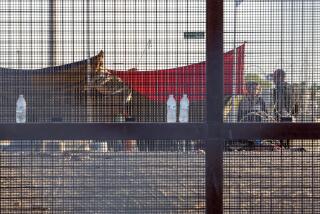9th Circuit judges: Minors who enter U.S. illegally may not be confined without court hearings
![âThese children are held in bureaucratic limbo, left to rely upon the [governmentâs] alleged benevolence and opaque decision making,â Judge Stephen Reinhardt wrote for the U.S. 9th Circuit Court of Appeals.](https://ca-times.brightspotcdn.com/dims4/default/ee17da1/2147483647/strip/true/crop/2048x1152+0+0/resize/1200x675!/quality/75/?url=https%3A%2F%2Fcalifornia-times-brightspot.s3.amazonaws.com%2Fcb%2F45%2F424ea450975a776b4d6d2a71b234%2Fla-1499286407-585tg2ufsd-snap-image)
Minors who enter the U.S. without permission must be given a court hearing to determine whether they can be released, a federal appeals court panel decided unanimously Wednesday.
A three-judge panel of the U.S. 9th Circuit Court of Appeals said immigration authorities continue to be bound by a 1997 lawsuit settlement that guaranteed court hearings for minor immigrants, set standards for their detention and established a policy in favor of their release.
After that settlement, Congress passed two laws dealing with unaccompanied minor immigrants. The federal government argued those laws replaced the settlement and revoked the right to bond hearings.
The 9th Circuit disagreed.
âIn the absence of such hearings, these children are held in bureaucratic limbo, left to rely upon the [governmentâs] alleged benevolence and opaque decision making,â Judge Stephen Reinhardt, a Carter appointee, wrote for the court.
The settlement of Flores vs. Janet Reno established that juveniles detained near the border or elsewhere without a parent must be given bond hearings.
The hearings gave minors the right to a lawyer, an opportunity to learn and challenge government evidence against them and the right to contest being locked up, the panel said.
The 9th Circuit cited evidence that the government has been holding minors for months or even years without hearings, even when parents are nearby and can care for them.
Among them was a boy identified only as Hector, who was stopped near the Mexico-California border at the age of 15 and held for 480 days, mostly in a locked facility in Yolo County.
In a declaration, Hector described the Yolo County facility as a prison, where minors were locked in cells at night to sleep on cement benches with mattresses.
During 16 months there, Hector was not given a lawyer or an explanation about why he was being held even though his mother in Los Angeles was seeking his release, the 9th Circuit said.
Without any explanation, the federal government released Hector in December âinto the custody of the person who had been advocating for his freedom all along â his mother,â Reinhardt wrote.
The court cited evidence that juveniles have agreed to deportation rather than face continued incarceration without their families.
âUnaccompanied minors today face an impossible choice between what is, in effect, indefinite detention in prison, and agreeing to their own removal and possible persecutionâ in their native countries, Reinhardt wrote.
The ruling upheld a decision by Los Angeles-based U.S. Dist. Judge Dolly M. Gee, an Obama appointee.
The government may appeal the panelâs decision to a larger 9th Circuit panel or to the U.S. Supreme Court.
Carlos Holguin, one of the lawyers for the juvenile immigrants, described Wednesdayâs decision as a modest victory. Other obstacles remain to obtaining the release of minors to family members, he said.
Nicole Navas Oxman, a spokeswoman for the U.S. Department of Justice, said federal lawyers were reviewing the ruling and considering which steps to pursue next.
Twitter: @mauradolan
UPDATES:
6:15 p.m.: This article was updated with comments from a case lawyer and the federal government.
2:55 p.m.: This article was updated to reflect that lawyers in the case could not be reached for comment.
This article originally was published at 1:10 p.m.
More to Read
Sign up for Essential California
The most important California stories and recommendations in your inbox every morning.
You may occasionally receive promotional content from the Los Angeles Times.










